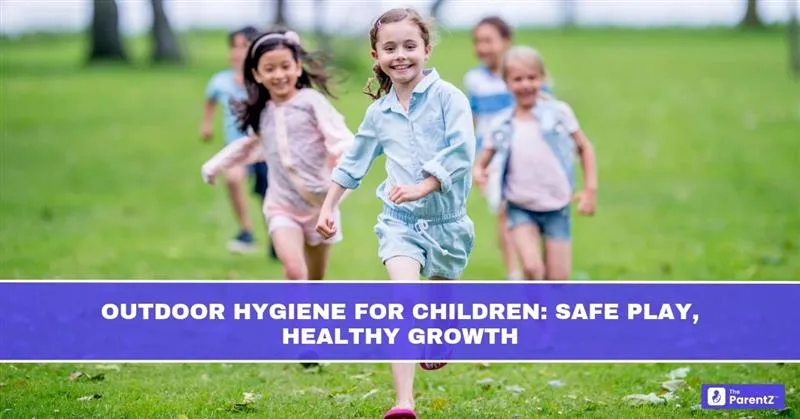Outdoor play is one of the foundations of a healthy childhood. Running, jumping, cycling, and exploring nature promote physical growth, improve coordination, and strengthen emotional and social skills. At the same time, children who play outdoors are exposed to dust, soil, stagnant water, and changing weather conditions. Without proper hygiene, these exposures can increase the risk of infections, skin problems, and seasonal illnesses. Safe outdoor play is not about restricting children but about teaching them simple hygiene practices that protect health while supporting growth.
Why Outdoor Hygiene Matters
Children’s immune systems are still developing, and their natural curiosity often leads them to touch, taste, or handle objects without caution. They may forget to wash their hands, walk barefoot, or play in puddles during the rainy season. This increases the chances of diarrheal diseases, worm infestations, skin infections, and mosquito-borne illnesses. According to pediatric public health guidelines, many of these illnesses can be prevented with basic hygiene habits. Outdoor hygiene is, therefore, a cornerstone of preventive child health.
Safe Play in Normal Seasons
In normal weather, outdoor hygiene primarily involves ensuring that play environments are clean and safe. Children should play in parks, school grounds, or gardens that are free from litter, animal waste, and broken glass. Parents and teachers should encourage the use of proper footwear to protect against injuries and skin contact with contaminated soil. After outdoor play, children must wash their hands with soap and water before eating. Nails should be trimmed regularly to reduce dirt accumulation, and clothes used during play should be washed to remove sweat and dust.
Outdoor Hygiene During the Rainy Season
The rainy season brings unique challenges. Waterlogging and muddy soil (“malik”) create ideal conditions for bacterial growth, fungal infections, and mosquito breeding. Children are often tempted to splash in puddles or walk barefoot in the mud, but these practices carry risks. Standing water can contain harmful germs that cause gastroenteritis, leptospirosis, and skin infections. Muddy soil can harbor hookworm larvae and fungal spores. Mosquitoes breeding in stagnant water spread malaria, dengue, and chikungunya.
Key hygiene practices in the rainy season include:
- Avoiding barefoot play in puddles or muddy fields.
- Ensuring children wear waterproof footwear if outdoor play is unavoidable.
- Bathing and changing clothes immediately after getting wet in the rain.
- Applying child-safe mosquito repellents and ensuring use of mosquito nets at night.
- Drinking only clean, boiled, or filtered water, since water contamination peaks during rains.
Skin and Hair Care After Outdoor Play
Skin is the first barrier of protection. Sweat, dust, and mud can irritate the skin or block pores. After play, children should bathe with mild soap and water. Special attention should be given to areas such as feet, between the toes, and under the nails, where mud and germs often collect. In the rainy season, fungal infections between the toes and on the scalp are common, so hair should also be washed regularly if it gets wet. Parents should ensure clothes are dried properly in sunlight to prevent fungal growth.
Oral Hygiene Linked to Outdoor Play
Children often put fingers, toys, or sports equipment into their mouths during play. This can transfer germs from soil or dirty surfaces. Pediatric dental guidelines emphasize rinsing the mouth with clean water after outdoor play. Regular brushing twice daily with fluoridated toothpaste strengthens teeth against cavities, especially important because street food or snacks eaten after play may carry dust and contaminants.
Nutrition and Hydration for Healthy Outdoor Activity
Outdoor play increases energy expenditure. Children who play actively need adequate hydration and balanced nutrition to support growth. In hot or humid weather, dehydration is common, so clean drinking water should always be available. Parents should avoid giving children packaged sugary drinks from roadside vendors, particularly during the rains, as these may be contaminated. Fresh fruits, clean homemade snacks, and safe water are the best choices to restore energy after play.
Community and Parental Responsibility
Maintaining outdoor hygiene is not only the responsibility of individual families. Communities and schools play a crucial role in keeping playgrounds safe. Regular cleaning of school yards, removal of stagnant water, trimming of overgrown bushes, and proper disposal of garbage reduce exposure to germs and mosquitoes. Parents should supervise young children during outdoor play and educate them gradually about safe practices, such as not putting soil or rainwater in their mouths and avoiding puddles.
When to Seek Medical Attention
Most outdoor-related health issues in children resolve with basic hygiene, but parents should seek medical advice if a child develops fever, vomiting, persistent diarrhea, severe cough, skin rashes that spread quickly, or wounds that do not heal. In the rainy season, unexplained fever with body pain should raise suspicion of mosquito-borne diseases such as dengue or malaria, which require prompt medical evaluation.
Conclusion
Outdoor play is essential for a child’s healthy growth and should never be discouraged. The key lies in ensuring proper hygiene. Clean play environments, protective footwear, regular handwashing, safe drinking water, and extra precautions during the rainy season form the basis of outdoor hygiene. When these simple practices are followed consistently, children can enjoy the benefits of fresh air and physical activity without falling ill. By balancing safe play with healthy habits, parents and communities can give children the freedom to explore while keeping them protected.





Be the first one to comment on this story.